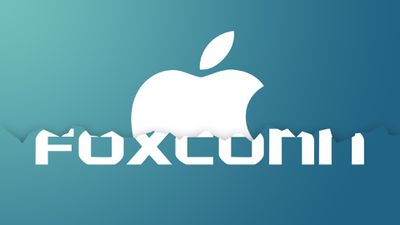iPhone Maker Foxconn Restarts Production in Shenzhen As Lockdown Partially Lifts
Apple's primary iPhone assembler Foxconn says it has resumed production at its Chinese manufacturing plant in Shenzhen, following a partial lifting of the city-wide lockdown that came into effect on Monday.

The Taiwanese company told Reuters it had restarted some production and operations at its Shenzhen campus after meeting government conditions for staff to live and work in bubble arrangements and adopting a "closed-loop management" system.
The system was used successfully during the Winter Olympics in Beijing and kept event personnel tightly sealed off from the public, with regular testing for those within.
"Some operations have been able to restart and some production is being carried out," Foxconn said in a statement, adding that the system at its Shenzhen facilities subjected employees living there to the required health measures.
"This process, which can only be done on campuses that include both employee housing and production facilities, adheres to strict industry guidelines and close-loop management policies issued by the Shenzhen government," it added.
It's not known which Apple products Foxconn produces at its two Shenzhen plants, but Foxconn is the largest maker of the iPhone. Manufacturers in Guangdong province, home to Shenzhen, said factory shutdowns have caused lags in deliveries, while logistical difficulties were making it harder to ship goods to overseas customers.
Foxconn on Wednesday conceded that 2022 would be "challenging" for the supply chain and forecast an up to 3% fall in revenue for the year – its first annual sales decline in six years – as a shortage of chips squeezes smartphone production and the pandemic shows no sign of easing in China.
Apple said the chip shortage cost it $6 billion in the last quarter of 2021, but predictions remained bullish for this year despite these strains on the global supply chain. That's despite Foxconn's warnings that the chip shortage is expected to run into the second half of 2022.
Note: Due to the political or social nature of the discussion regarding this topic, the discussion thread is located in our Political News forum. All forum members and site visitors are welcome to read and follow the thread, but posting is limited to forum members with at least 100 posts.
Popular Stories
Since the iPhone X in 2017, all of Apple's highest-end iPhone models have featured either stainless steel or titanium frames, but it has now been rumored that this design decision will be coming to an end with the iPhone 17 Pro models later this year.
In a post on Chinese social media platform Weibo today, the account Instant Digital said that the iPhone 17 Pro models will have an aluminum...
Apple is continuing to refine and update iOS 26, and beta three features smaller changes than we saw in beta 2, plus further tweaks to the Liquid Glass design. Apple is gearing up for the next phase of beta testing, and the company has promised that a public beta is set to come out in July.
Transparency
In some apps like Apple Music, Podcasts, and the App Store, Apple has toned down the...
The calendar has turned to July, meaning that 2025 is now more than half over. And while the summer months are often quiet for Apple, the company still has more than a dozen products coming later this year, according to rumors.
Below, we have outlined at least 15 new Apple products that are expected to launch later this year, along with key rumored features for each.
iPhone 17 Series
iPho...
Apple should unveil the iPhone 17 series in September, and there might be one bigger difference between the Pro and Pro Max models this year.
As always, the Pro Max model will be larger than the Pro model:iPhone 17 Pro: 6.3-inch display
iPhone 17 Pro Max: 6.9-inch displayGiven the Pro Max is physically larger than the Pro, it has more internal space, allowing for a larger battery and...
In 2020, Apple added a digital car key feature to its Wallet app, allowing users to lock, unlock, and start a compatible vehicle with an iPhone or Apple Watch. The feature is currently offered by select automakers, including Audi, BMW, Hyundai, Kia, Genesis, Mercedes-Benz, Volvo, and a handful of others, and it is set to expand further.
Apple has a web page with a list of vehicle models that ...
In select U.S. states, residents can add their driver's license or state ID to the Wallet app on the iPhone and Apple Watch, providing a convenient and contactless way to display proof of identity or age at select airports and businesses, and in select apps.
Unfortunately, this feature continues to roll out very slowly since it was announced in 2021, with only nine U.S. states, Puerto Rico,...
New renders today provide the best look yet relocated Apple logo and redesigned MagSafe magnet array of the iPhone 17 Pro and iPhone 17 Pro Max.
Image via Majin Bu.
Several of the design changes coming to the iPhone 17 Pro model have been rumored for some time, such as the elongated camera bump that spans the full width of the device, with the LiDAR Scanner and flash moving to the right side.
...
Apple is expanding the ability to add an Apple Account Card to the Wallet app to more countries, according to backend Apple Pay changes.
With iOS 15.5, Apple updated the Wallet app to allow users to add an Apple Account Card, which displays the Apple credit balance associated with an Apple ID.
If you receive an Apple gift card, for example, it is added to an Apple Account that is also...
Apple's next-generation iPhone 17 Pro and iPhone 17 Pro Max are just over two months away, and there are plenty of rumors about the devices.
Below, we recap key changes rumored for the iPhone 17 Pro models.
Latest Rumors
These rumors surfaced in June and July:Apple logo repositioned: Apple's logo may have a lower position on the back of the iPhone 17 Pro models, compared to previous...






















